Cardio-oncology: an expert's overview
Written by:Leading cardiologist Dr Arjun Ghosh explains the concept of cardio-oncology, including what types of cancers a cardio-oncologists treats and the differences between cardio-oncology and chemotherapy.

What is cardio-oncology?
Cardio-oncology refers to the care of cancer patients who:
- Have pre-existing heart disease.
- Go on to develop cardiac disease due to cancer treatment.
- Are at high risk of developing cardiac disease due to cancer treatment.
What does a cardio-oncologist do?
A cardio-oncologist specialises in minimising cardiac problems during cancer therapy (chemotherapy, immunotherapy and radiotherapy). They assess patients before, during and after cancer treatment and offer advice to decrease the risk of heart damage (cardiotoxicity).
The main aim of cardio-oncology is to prevent unnecessary interruptions to cancer treatment, allowing it to be completed successfully.
What cardiac conditions fall under cardio-oncology?
All varieties of cancer treatment can potentially cause cardiac damage; some to a greater extent and others to a lesser extent. All parts of the heart can potentially be affected by cancer treatment. In some cases, cancer treatment can lead to damage in certain parts of the heart, which can result in the following problems:
- Damage to the heart muscle may lead to heart failure.
- Electrical wiring in the heart can provoke rhythm problems.
- Damage to heart arteries may lead toto heart attacks.
- Heart valve damage can result in premature valve disease.
A cardio-oncologist tries to prevent these problems from occurring in the first place and manages them if they develop.
What types of cancer do cardio-oncologists treat?
All types of cancer treatments can potentially cause cardiotoxicity. Commonly, patients with breast, prostate, gastrointestinal and renal cancer will visit a cardio-oncologist to check on the status of their health following treatment.
A cardio-omcologist may also review a variety of blood cancer patients with lymphoma, amyloid, myeloma and leukaemia. In addition to this, cardio-oncologists also manage tumours in the heart.
What is the difference between cardio-oncology and chemotherapy?
Cardio-oncology deals with managing cancer patients with cardiac issues. Chemotherapy is one of the types of cancer treatment that may lead to cardiac problems that a cardio-oncologist then needs to treat.
What does a typical cardio-oncology treatment plan look like?
Treatment plans for cardio-oncology are very individualised and the cardio-oncologist works closely with the oncologist in order to formulate the plan. It may involve/ consist of cardiac medications which can be used to improve heart function, or surveillance scans over the course of treatment to detect early signs of heart disease and allow for early intervention.
If you would like to book a consultation with Dr Ghosh, do not hesitate to do so by visiting his Top Doctors profile today.


